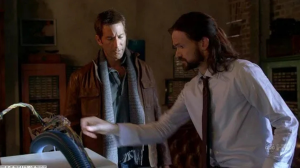Brie Larson will soon be fighting Thanos as Captain Marvel on the big screen, but during her speech at the Crystal + Lucy Awards she took on a different kind of battle, one far more real and no less important.
Videos by ComicBook.com
Larson was accepting the Crystal Award for Excellence in Film, but during her acceptance speech, she decided to dedicate her time to a recent study from USC Annenberg titled Critic’s Choice, which tackles the lack of women and people of color amongst the film critic and reviewer scene.
“So earlier this week USC Annenberg’s inclusive initiative released findings that 67% of the top critics reviewing the 100 highest grossing movies in 2017 were white males,” Larson said. “Less than a quarter were white women, and less than 10% were unrepresented men. Only 2.5% of those top critics were women of color. So you’re probably thinking right now ‘like wow that super doesn’t represent the country that I live in and that’s because that’s true. This is a huge disconnect from the U.S. population breakdown of 30% white men, 30% white women, 20% men of color, and 20% women of color.”
Under-representation of women and people of color is anything new in regards to Hollywood, what isn’t brought up as much is how that carries over to the film criticism world.
“On top of all of this, am I saying that I hate white dudes…no, I am not,” Larson said. “What I’m saying is is that if you make a movie that is a love letter to women of color, there is an insanely low chance that a woman of color will have the chance to see your movie and review your movie. And this is also not to mention other people besides white dudes like Star Wars, and would love the opportunity to do a set visit.”
Larson reiterated that this isn’t a discussion that is looking to keep white male critics out but looking to make sure that they aren’t the only ones let in the clubhouse.
“And I’m also saying I don’t hate white dudes, I’m just saying we need to be conscious of our bias and do our part to make sure that everyone is in the room,” Larson said.
It’s all the more important because reviews do have an impact on films these days, whether that is just getting people to notice something under the radar or spreading the word about a blockbuster film is worth seeing.
“It really sucks that reviews matter, but reviews matter,” Larson said. “Good reviews out of festivals give small independent films a fighting chance to be bought and seen. Good reviews help films gross money. Good reviews slingshot movies into awards contenders. A good review can change your life, it changed mine.”
Larson went on to point out that while Hollywood is finally expanding and reaching out to a more diverse audience, the criticism side of the equation needs to expand as well, especially when reviewing films that are
“Our industry has gone through a major growth,” Larson said. “We are expanding to make films that better reflect the people that buy movie tickets, but they are not allowed enough chances to read public discourse on the films by the people that these films were made for. I do not need a forty-year-old white dude to tell me what didn’t work for him about A Wrinkle In Time. It wasn’t made for him. I want to know what that film meant to women of color. To biracial women. To teen women of color. To teens that are biracial, and for the third time, I don’t hate white dudes. These are just facts. These are not my feelings, and I’m sorry Lindsey (her publicist) please don’t kill me.”
It isn’t about excluding people from this profession, but rather about bringing more people into the tent, therefore giving more well-rounded criticism as well as knowledge about the film genre in general.
“As some of you know I immediately jumped onto Frances’ brilliant words Inclusion Rider, and this was way before she had bumper stickers for her iPad because I know that this means my work will be shown, digested, discussed by a variety of people, not just a singular perspective. I want to know what my work means to the world, not a narrow view,” Larson said.
You can find the entire USC Annenberg study right here.
As for Captain Marvel, you can check out what we really hope to see in the film right here.
Avengers: Infinity War is in theaters now. It will be followed by Ant-Man and the Wasp on July 6, 2018, Captain Marvel on March 8, 2019, the fourth Avengers movie on May 3, 2019, the sequel to Spider-Man: Homecoming on July 5, 2019, and Guardians of the Galaxy Vol. 3 in 2020.
[H/T Variety]








